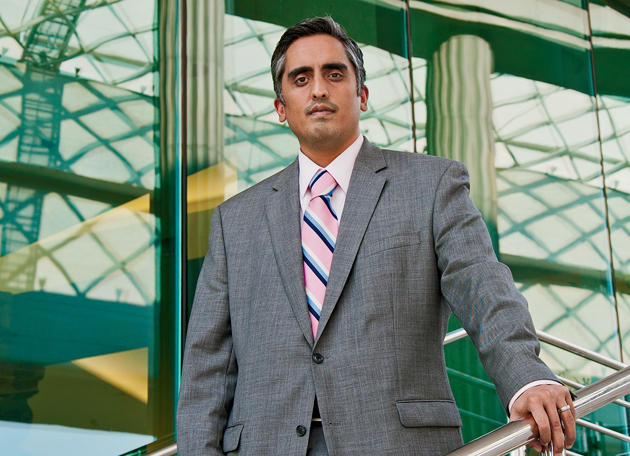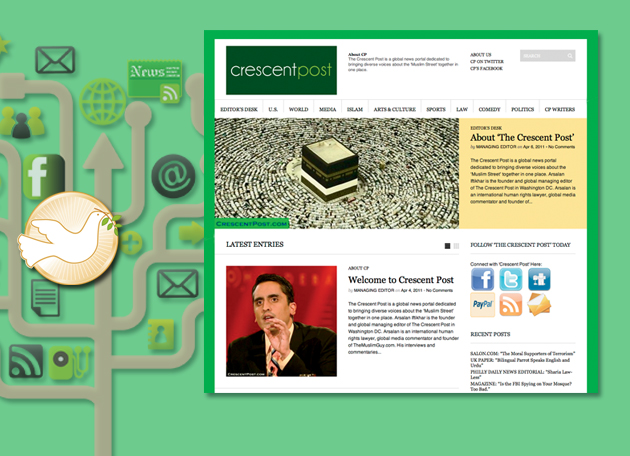
Whether they awoke to a ringing phone at 5:46 a.m. Pacific time or were gulping coffee-to-go a little before 9 back East, Americans everywhere tend to remember how they heard the unthinkable on Sept. 11, 2001: that planes had crashed into New York City’s World Trade Center. Arsalan Iftikhar, AB ’99, JD ’03, was a second-year law student asleep in his dorm room in the university’s Village residential area when his call came in.
“I jerked awake,” Iftikhar recalls. “It was a law school classmate. She said, ‘Turn on the TV.’ I did, and the North Tower was smoking. Shortly after the second plane hit, news networks were saying who might be responsible — and I knew immediately that the Muslim community needed to issue a very quick statement condemning the attacks.”
At that moment, 10 days after his 24th birthday, Arsalan Iftikhar’s life changed.
“I jumped to my laptop, drafted a condemnatory statement, and sent it to the editorial board of every major newspaper in the country,” he says.
“I jumped to my laptop, drafted a condemnatory statement, and sent it to the editorial board of every major newspaper in the country,” he says. Within minutes, The New York Times, USA Today and perhaps 20 other papers began calling. Iftikhar’s editorial comment ran in the Times on Sept. 13 and in USA Today the following day. Requests for interviews came in daily from television, radio and newspapers; a few weeks later, he was giving as many as four TV interviews, 10 newspaper interviews and 20 radio interviews a day. Once he went 96 hours without sleeping.
Iftikhar went on to complete his law degree and become an international human rights lawyer. But the events of that fateful day — the human catastrophe and the terrorists’ betrayal of the Islamic faith — changed his life’s trajectory. And the deeply concerned on-campus meetings, sponsored by the Muslim Students Association, with professors and other students set him on a path toward providing positive messaging. Consequently, from that fall in St. Louis to the present day, laptops, microphones and television cameras have been omnipresent instruments of his life’s peacekeeping mission.
“The brown Muslim guy”
A student of political science and Middle East studies in his undergraduate years, Iftikhar is an indefatigable Islamic pacifist and global managing editor of the online Muslim newspaper The Crescent Post (www.crescentpost.com/). A portal for news about Islam and Muslims, the site debuted in April 2011 and already “has received positive comments from sectors including the White House, the U.S. State Department and major news media,” Iftikhar says.
“I know a lot of young Muslims who are very disheartened that people like [the late] Osama bin Laden hijacked the narrative of their faith and culture,” Iftikhar says. “I hope they will cover the positive things Muslims are doing.”
“So much information about Muslims today is shaped by others that I’m trying to cultivate the next generation of Muslim writers around the world,” he says. “I know a lot of young Muslims who are very disheartened that people like [the late] Osama bin Laden hijacked the narrative of their faith and culture. I hope they will cover the positive things Muslims are doing.”
Several years ago, Iftikhar — also a contributing editor of the Los Angeles–headquartered global affairs magazine Islamica (islamicamagazine.com/) — launched a now-thriving blog. Its name, TheMuslimGuy.com, is his sardonic nod to a stereotype made manifest a few years back whenever he appeared on television flanked by certain longtime politicians and pundits. “I was [just] the brown Muslim guy,” Iftikhar says. He adds, “And when you’re the brown Muslim guy on Bill O’Reilly’s show, let’s say, you can imagine the kind of mail you receive afterward.”
Iftikhar also contributes to the weekly “Barbershop” segment of the National Public Radio program Tell Me More. His interviews, analyses and commentaries have appeared in virtually every major media outlet: for example, CNN, BBC World News, MSNBC, Fox News and Al-Jazeera English, as well as Time, The Economist and Rolling Stonemagazines. He has more than 10,000 followers on Facebook and Twitter. He has lectured at churches, synagogues and universities around the world, and in September 2010, he was an Assembly Series speaker at Washington University. (Associate Dean of Students Jill Stratton, who oversaw his work as resident adviser to 50 students while he was in law school, facilitated the event.) Iftikhar’s newly published book, Islamic Pacifism: Global Muslims in the Post-Osama Era (September 2011), is available on Amazon.com and www.IslamicPacifism.com.
As a national spokesperson for the American Muslim community, Iftikhar has no time to practice law these days. For recreation, he lends his vast energy and his 6-foot-4-inch frame to two basketball leagues in his adopted city, Washington, D.C. (During high school in Chicago, he was a ball boy for the Bulls when Michael Jordan was on the roster.)
“It’s to the point where my own mortality means virtually nothing to me,” Iftikhar says. “While I’m here, I’m doing what I can — as we all should — to help advance humanity, so the next person who comes along can move the ball forward.”
Iftikhar’s calling has put not only his financial health but also his life on the line. “I’ve received hundreds of death threats — hundreds,” he says. “It’s to the point where my own mortality means virtually nothing to me. While I’m here, I’m doing what I can — as we all should — to help advance humanity, so the next person who comes along can move the ball forward.”
During a moving radio segment Iftikhar taped with his father for NPR’s “StoryCorps” archives, Tariq Iftikhar, an orthopedic surgeon in Chicago, said he has come to terms with the idea that his son lives in danger. “I hope it doesn’t happen in front of us,” he told his son, referring to Arsalan’s mother, Warda, “but history will tell that at least when you left this world there was some positive impact.”
Mentors and inspirational influences
Arsalan may have found his path on 9/11 because his father was such a powerfully inspirational influence. Arsalan was 17 when Tariq did pro bono surgeries on Bosnian refugees who had escaped a genocidal war. Both father and son were profoundly touched when a patient wrote later that he had named his newborn son Tariq. In 2005, the surgeon worked with Doctors Without Borders in earthquake-devastated South Asia.
Arsalan Iftikhar is grateful that his mission has brought his family even closer — and expresses gratitude to Washington University as well. He particularly thanks mentors Leila Nadya Sadat, the Henry H. Oberschelp Professor of Law and director of the Harris World Law Institute, and Itai Sened, professor of political science, “my undergraduate adviser and dear friend.”
Of the university administration and infrastructure, he says: “For two months [after 9/11], while I was receiving threats and people were recognizing me on the street, [Chancellor] Mark Wrighton put 24-hour security outside my dorm room. The university police chief, Don Strom, became a good friend. Washington U. will always be part of my family because of the love I received, and I hope I can show that in return. It’s the greatest school in the country.”
In the decade since graduation, “I feel as if I’ve aged 60 years,” he says ruefully. “But I never want to get complacent.”
The idea is unimaginable. A measure of Iftikhar’s commitment to Islamic and global pacifism is his dream — just as some children aspire to be president — of winning the Nobel Peace Prize one day. Osama bin Laden’s death and the “Arab Spring” are momentous phenomena, he says, and “the next decades will dictate whether we take a course toward peace, or in another direction.”
Judy H. Watts is a freelance writer based in St. Louis and a former editor of this magazine.
